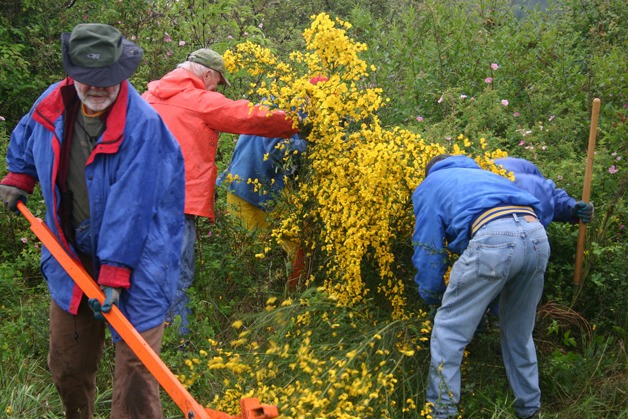Island County commissioners will consider this week increasing funding that helps combat a growing noxious weed issue.
The Washington State University Extension office is requesting funding that would increase the salary for the county’s Noxious Weed Coordinator Janet Stein.
Stein is currently paid through state grants which are designated for certain areas or certain plants, according to Island County Extension Director Tim Lawrence.
These designated funding sources can be limiting when attention needs to be paid to unfunded areas and plants.
Lawrence said weeds like tansy ragwort and poison hemlock are getting out of control in some areas.
“She’s done an outstanding job of helping with this effort,” Lawrence said of Stein. “That’s why it’s important to have a noxious weed coordinator. But we need to get a better handle on these noxious weeds.”
While strides have been made through education and volunteer work to rid the island of these invasive plants, more can always be done, according to Stein.
“Here it’s really going to take a community effort,” Stein said.
As a smaller county, Island County does not have the inspectors and removal teams that other larger counties might have.
So for Island County, Stein said, education is key.
“The thing about Island County is we don’t have a big budget for our program here,” Stein said.
Lawrence said he will be requesting that Stein’s part-time position, designated as a .5, be increased to a .7, giving Stein more time in the summer to dedicate to education and eradication.
Commissioners will consider the proposal at a work session this week.
Noxious weeds are undesirable non-native plants that have economic, ecological, or aesthetic implications, according to the WSU Extension service. Noxious weeds are often highly destructive and extremely competitive with native plants, making them very difficult to control.
The impact of these plants vary, but can be quite damaging. For a farmer, noxious weeds can ruin crops and grazing lands. For city dwellers, the weeds can overcome gardens and pathways, and decrease home values. They can also destroy valuable natural resources like wetlands and animal habitats.
Depending on which of four classifications noxious weeds fall in, landowners could be required to simply control the plant or completely eradicate it whenever possible.
Class A weeds are plants whose presence in Washington is still limited. Preventing new infestations and eradicating existing infestations are required by law. Class B weeds are limited to certain areas of the state. Class C weeds are the noxious weeds that are already widespread and control enforcement is allowed on a county level, if desired.
The county’s most common noxious weeds include tansy ragwort, a yellow flowering plant that is toxic to livestock; purple loosestrife, a white flowering plant that is known to take over and destroy wetlands; spartina, a grass-like plant, that takes over shorelines and requires eradication; and Canada thistle, which grows pink flowering pods and can take over farmer crops.
While some are more common than others, Island County’s noxious weed list spans two pages and lists more than 100 plants.
“I think everybody has to be aware,” Stein said. “Even small lots can be a source of the weed seeds.”
Stein said the noxious plants are often introduced quite innocently, like seeds stuck on clothing or a gardener bringing plants home from a trip abroad.
While not all non-native plants are bad for the island, Stein said some behave better than others.
The state has required landowners to control the noxious weeds within their property since 1881. But not until 1969 was there active enforcement of that requirement.
Island County has its own Noxious Weed Control Board, which implements laws and guidelines of the state code and works in collaboration with Washington State University Extension to provide education to landowners and the community.
The WSU Extension website provides information and pictures of all the noxious weeds so that landowners can identify them and find out how to deal with them. Stein said people are also welcome to contact her office with questions or email her a picture of the plant in question.
Landowners can then work with the WSU Extension office to implement the correct controls. In some cases, a small amount of state funding can be acquired to assist property owners control or eradicate the weeds.
Questions about noxious weeds can directed to 360-678-7992.



